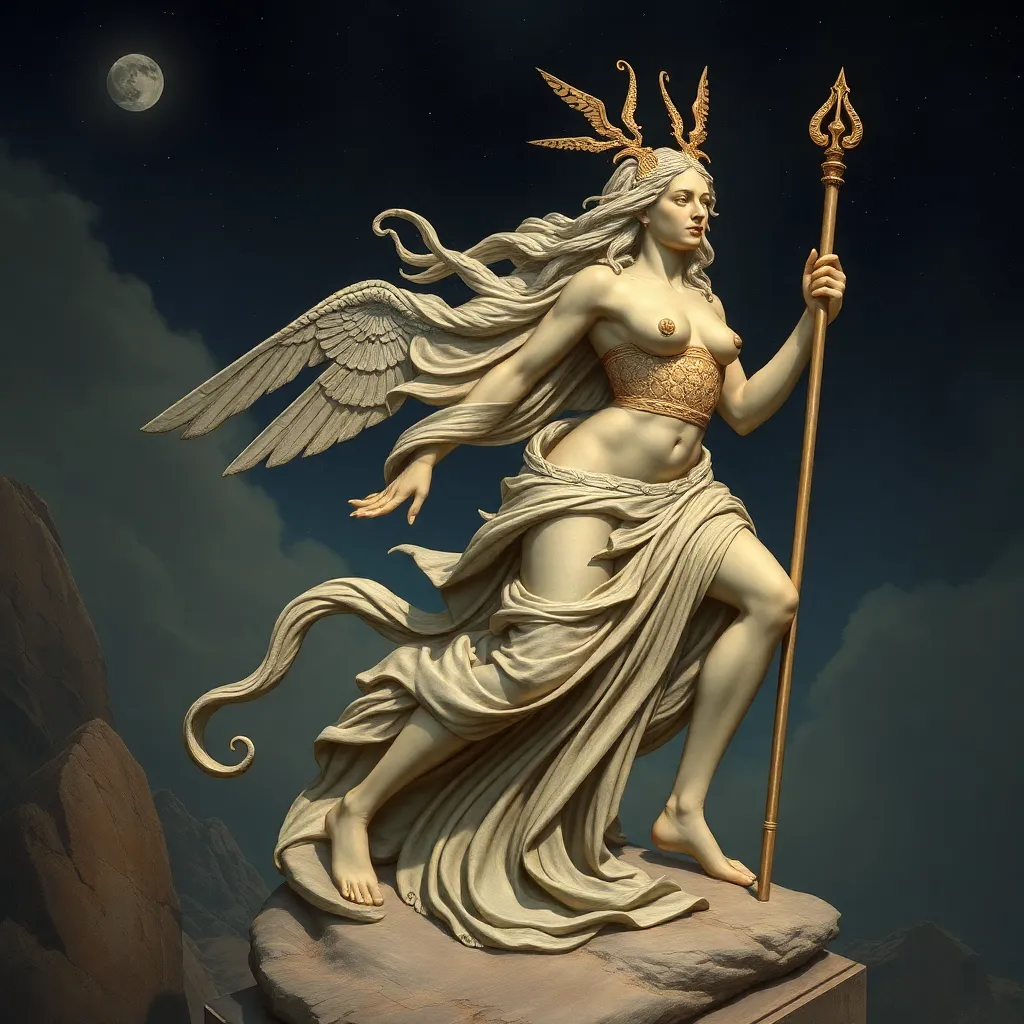The Titaness Dione: An Overlooked Figure in Mythology
I. Introduction to Dione
Dione is often overshadowed by her more famous counterparts in Greek mythology, yet she holds a unique place in the pantheon of deities. As a Titaness, Dione embodies themes of fertility, the earth, and the divine feminine. Her significance in mythology warrants exploration, particularly as we seek to uncover the stories of lesser-known figures.
Understanding figures like Dione not only enriches our knowledge of Greek mythology but also highlights the diverse roles women played in these ancient narratives. Through her exploration, we can gain a deeper appreciation for the complexities of mythological storytelling.
II. Origins and Genealogy
Dione’s origins are rooted in the Titan hierarchy, which places her among the primordial beings of Greek myth. According to Hesiod, she is one of the daughters of Uranus (the sky) and Gaia (the earth), positioning her within a powerful lineage of deities.
In terms of relationships, Dione is often linked to Zeus, the king of the gods, with whom she is sometimes credited as the mother of Aphrodite, the goddess of love and beauty. This connection not only cements her significance as a mother figure but also as a bridge between the Titans and the Olympians.
When compared to more prominent figures like Rhea, the mother of the Olympians, or Themis, the goddess of divine law, Dione’s story is less emphasized, yet her connections to the earth and fertility are essential to understanding the fabric of Greek mythology.
III. Dione’s Role in Mythology
Dione’s role in mythology extends beyond her genealogy; she serves as a vital mother figure. Her children, particularly Aphrodite, embody essential qualities of beauty, love, and desire, which are pivotal in numerous myths. Through Aphrodite, Dione’s influence can be traced in many stories that explore the nature of love and attraction.
Additionally, Dione is associated with the Oracle of Dodona, one of the oldest oracles in Greece. The oracle was dedicated to Zeus, but Dione held a significant role as a goddess of prophecy, emphasizing her connection to the divine and the earth.
- Themes of Fertility: Dione is often depicted as a nurturing figure, embodying the earth’s fertility, which is crucial for agricultural societies.
- Connection to Nature: Her association with the earth signifies her role as a protector of natural cycles and the sustenance of life.
IV. Dione in Literature and Art
Dione’s presence in ancient literature is sparse but notable. She appears in various texts, including the works of Homer and Hesiod, where her divine attributes are acknowledged. In the “Iliad,” Dione is seen as a nurturing figure, comforting her daughter Aphrodite during a moment of distress.
Artistic representations of Dione have evolved over the centuries, from classical sculptures to modern interpretations. In ancient art, she is often depicted alongside her daughter or in conjunction with nature, emphasizing her connection to fertility and the earth.
When compared to other goddesses, Dione’s portrayal is often subdued, reflecting the patriarchal narratives that dominate much of Greek mythology. This nuanced representation invites analysis of how female figures were depicted and the implications of their roles.
V. Dione and the Cult of the Gods
Dione’s worship, though less prominent than that of other deities, reveals much about local cult practices in ancient Greece. Her association with the Oracle of Dodona indicates a significant local following, where rituals and offerings were made to seek her favor and guidance.
Her influence on local cults is a testament to the regional variations in worship, demonstrating how different communities honored various aspects of the divine feminine. However, as more popular deities like Athena and Artemis rose to prominence, Dione’s worship began to decline.
- Worship Practices: Offerings to Dione often included fruits and flowers, symbolizing her connection to fertility and nature.
- Local Traditions: Some regions incorporated Dione into their cults, blending her attributes with those of other deities.
VI. Comparative Analysis with Other Titanesses
When examining Dione in relation to other Titanesses like Rhea and Themis, several similarities and differences emerge. Rhea, known as the mother of the Olympians, embodies nurturing and protection, while Themis represents justice and order. Dione shares themes of motherhood and fertility but is often relegated to a more obscure status.
Unique attributes that set Dione apart include her direct connection to the earth and her role as a prophetic figure through the Oracle of Dodona. This aspect of her character highlights the diverse ways in which Titanesses were portrayed in mythology.
The impact of patriarchal narratives cannot be overlooked. Dione’s recognition has often been overshadowed by the more dominant figures in mythology, prompting a reconsideration of how we view these ancient narratives.
VII. Modern Interpretations and Relevance
In contemporary culture, Dione is experiencing a resurgence as scholars and artists seek to reclaim her narrative. Her story resonates with modern discussions of gender, representation, and the importance of recognizing overlooked figures in history.
Dione serves as a symbol of the divine feminine, representing qualities of strength, nurturing, and wisdom. Her narrative invites us to reconsider the roles of women in mythology and how their stories can inform our understanding of cultural history.
- Contemporary Literature: Authors are increasingly incorporating Dione into new myths and retellings, highlighting her significance.
- Gender Discussions: Dione’s story contributes to broader dialogues about women’s roles in myth and society.
VIII. Conclusion
In summary, Dione’s contributions to Greek mythology are multifaceted and deserving of recognition. As a Titaness, she embodies essential themes of fertility, the earth, and prophecy. By exploring her narrative, we can appreciate the richness of lesser-known figures in mythology and their impact on cultural storytelling.
It is essential to acknowledge and appreciate these overlooked narratives, as they offer valuable insights into the complexities of ancient beliefs and the roles women played within them. Further exploration of Titaness mythology can enhance our understanding of these vital figures and their lasting significance.




